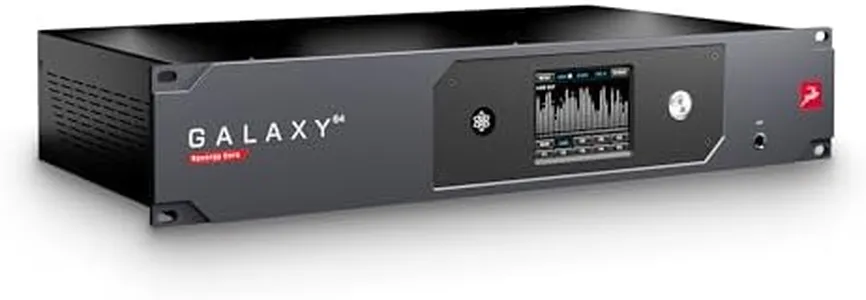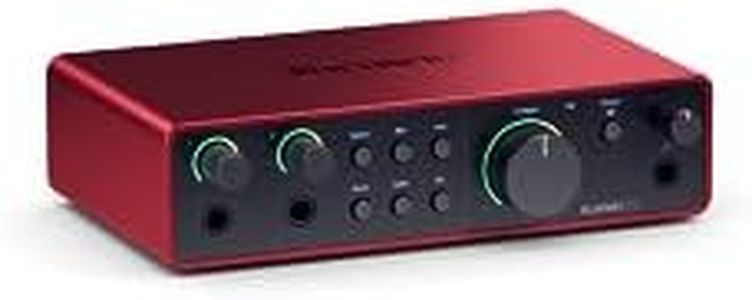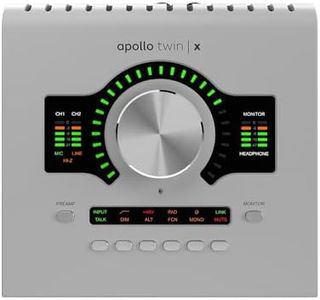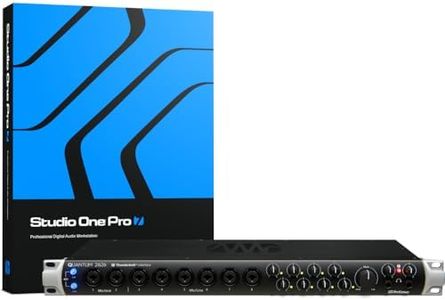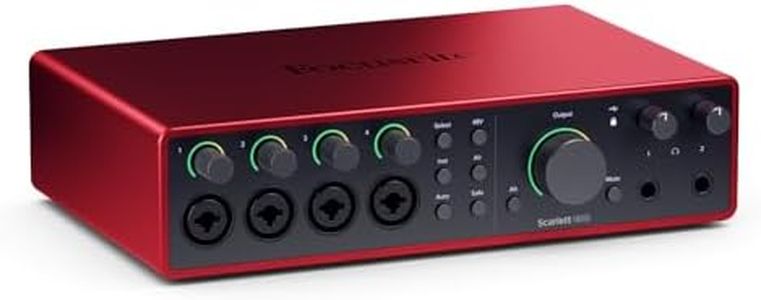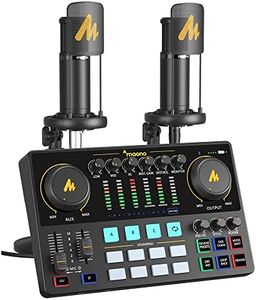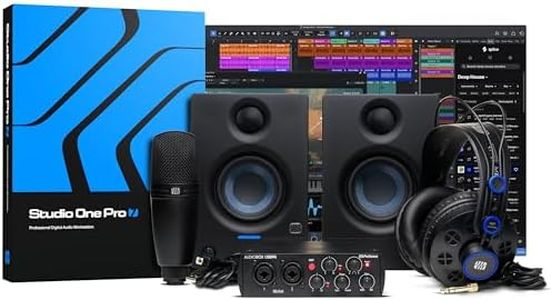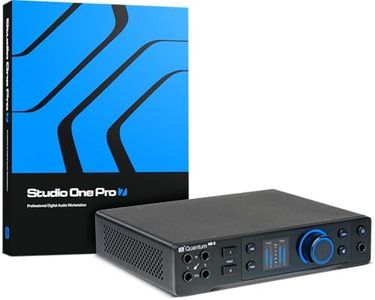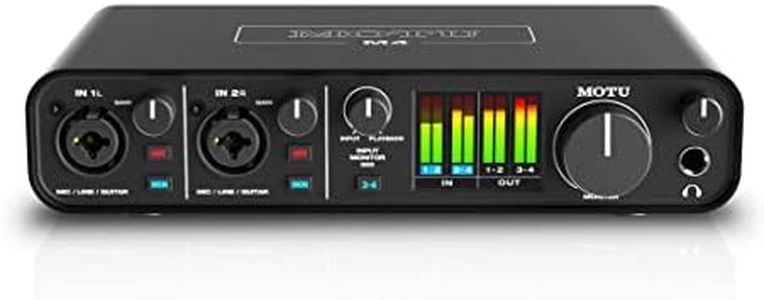10 Best Audio Interfaces 2026 in the United States
Our technology thoroughly searches through the online shopping world, reviewing hundreds of sites. We then process and analyze this information, updating in real-time to bring you the latest top-rated products. This way, you always get the best and most current options available.

Our Top Picks
Winner
Focusrite Scarlett 2i2 4th Gen USB Audio Interface for Recording, Songwriting, Streaming and Podcasting — High-Fidelity, Studio Quality Recording, and All the Software You Need to Record
Most important from
33631 reviews
The Focusrite Scarlett 2i2 4th Gen is a solid choice for anyone looking to record or stream with professional-sounding quality without needing complicated gear. It offers 2 inputs and 2 outputs, which suits solo musicians, podcasters, and small setups. The audio quality is impressive, featuring a 120dB dynamic range and the same converters used in top studio equipment, ensuring clear, detailed sound. Its USB-C connection makes it easy to plug into most computers and even some tablets and smartphones, offering good versatility. It provides phantom power for condenser microphones, which is essential for many vocal and instrument mics.
The built-in preamps are highly regarded, delivering clean and transparent sound with an added “Air” mode that brightens vocals and guitars for a more polished result. Latency is kept low, so you won’t notice delays while recording or performing live. The unit’s aluminum body is compact and sturdy, making it portable and durable for home or on-the-go use. One big plus is the included software bundle, which gives you popular recording programs and plugins to get started right away without extra purchases.
On the downside, with only 2 inputs, it’s less suitable if you plan to record multiple sources simultaneously or larger bands. Also, while the USB 2.0 interface is reliable, it’s not the fastest standard available, though this rarely impacts typical home recording. The Scarlett 2i2 4th Gen delivers excellent sound quality, user-friendly features, and decent portability, making it among the best options for beginner to intermediate audio interfaces aimed at recording, streaming, and songwriting.
Most important from
33631 reviews
Universal Audio Apollo Twin X DUO Gen 2 Studio + Edition Thunderbolt 3 Audio Interface
Most important from
43 reviews
The Universal Audio Apollo Twin X DUO Gen 2 Studio + Edition Thunderbolt 3 Audio Interface is a high-quality option for those serious about audio recording and mixing. With 32 channels, it offers ample input and output capabilities for various recording needs. The audio quality is outstanding, thanks to its high bit depth and sample rate, ensuring precise sound reproduction. The Unison preamps are a notable feature, providing authentic emulations of classic analog tones from brands like Neve and API, which is excellent for achieving professional sound quality in real-time recordings.
The inclusion of over 200 UAD DSP and Native plugins further enhances its versatility and creative potential. Connectivity is robust with Thunderbolt 3, ensuring fast data transfer and low latency, which is crucial for seamless recording sessions. The interface also supports phantom power, making it suitable for use with condenser microphones. Latency is minimal, allowing for smooth, uninterrupted recording and monitoring. The preamp quality is top-notch, delivering clear and detailed sound. Build quality is solid and portable, making it suitable for both studio and mobile setups. However, it is relatively heavy at 4.4 pounds.
On the software side, it is compatible with major DAWs like Pro Tools, Logic Pro, Cubase, and more, which is a big plus for users working across different platforms. The Apollo Monitor Correction and Auto-Gain features are user-friendly and enhance the recording experience. Despite its many strengths, the product does have a few drawbacks. It is relatively expensive, which might not be ideal for beginners or those on a tight budget. Additionally, the software setup might be complex for those not familiar with high-end audio gear. In summary, this audio interface is best suited for professional musicians, producers, and audio engineers who require high-quality sound, extensive features, and reliability in their recording setup.
Most important from
43 reviews
PreSonus Quantum 2626 with Studio One Pro Software
Most important from
417 reviews
The PreSonus Quantum 2626 is a solid choice if you want a fast, high-quality audio interface, especially for home studios or small professional setups. It stands out with its Thunderbolt 3 connection, offering incredibly low latency (under 1 ms), which means the sound you input or record feels instant, a big plus for musicians who need real-time monitoring. It supports up to 26 channels, with 8 excellent XMAX preamps that provide clear, detailed sound, making it suitable for recording multiple microphones or instruments at once. The 24-bit/192kHz converters ensure clean audio with a wide dynamic range, capturing subtle audio details well. You get a good mix of inputs and outputs: 2 combo inputs for mics or instruments, plus 6 mic/line inputs, plus plenty of output options including headphone jacks with separate volume controls. It also supports phantom power needed for condenser microphones and includes MIDI and word clock connections for wider studio compatibility.
The included software bundle, featuring Studio One Artist and Ableton Live Lite, adds value for those starting or upgrading their recording setup. However, it requires a Thunderbolt 3 port, so it won’t work with all computers without the right connection, and it might feel a bit bulky compared to ultra-compact interfaces. At about 5 pounds, it’s more desktop-friendly than truly portable. If you need a highly responsive, versatile interface with strong preamps and plenty of channels for recording multiple sources simultaneously, the Quantum 2626 fits well. But if you want the simplest or smallest setup, or don’t have Thunderbolt 3, you might want to explore other options.
